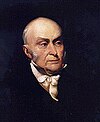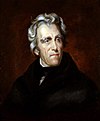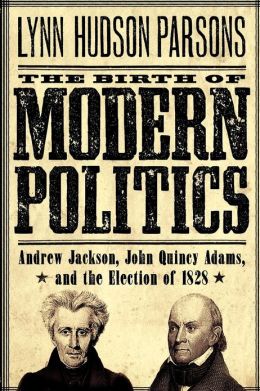Andrew Jackson abolished the Bank of the United States, triggering a financial crisis and recession. Lets take his face off the $10 bill.Last night 15 members of our book club met at Barnes and Noble to discuss The Birth of Modern Politics: Andrew Jackson, John Quincy Adams, and the Election of 1828 by Lynn Hudson Parsons. The book deals with the presidential elections of 1824 and 1828.
Comment by one of our members.
A great deal of the discussion revolved around the title itself and we concluded that the election of 1828 was not "the birth of modern politics".
It was suggested that it might rather be considered a "watershed election" in the sense that earlier trends culminated in 1828 and new trends followed that election.
Between 1776 and 1828:
- The population had grown as had the number of states
- The number of states using popular election of presidential electors had increased
- Franchise had been extended to all adult white males, without property requirements
- The exports from southern plantations had increased in magnitude and value
- Manufactures from the north-east had increased, and the businesses in the region were demanding tariffs to protect their industries.
- Southern planters, who dominated their states politics, increasingly opposed tariffs which increased the costs of many of their purchases and tended to decrease their export profits.
- Urbanization had increased, especially in the northeast.
- The number of states had increased from the original 13 to 24, and the western states had still different priorities than did the original coastal states
- Communications had improved
- The number of newspapers had increased
- A first and then a second Bank of the United States had been created, and the desirability of having a national bank had continued to be highly controversial.
It was noted that early in U.S. history many presidents had foreign policy experience and that ceased to be true after 1828. It was suggested that the threat to the nation from European powers had diminished as the United States grew stronger economically and militarily, but also that the idea of Manifest Destiny was taking hold and people's attention was increasingly directed to western expansion. Still there was and would remain for decades a significant threat to the interests of the new nation from foreign powers.
As an aside we discussed the knowledge that people might have had in the 1820s of the west. The Lewis and Clark expedition would have been known and people probably had a positive idea of the economic potential of the lands along their routes. They would have known of the Rocky Mountains, the Pacific Coast and the colonies in Texas and New Mexico. They apparently overestimated the agricultural potential of the great plains, and probably did not know of the great deserts of the South West and Great Basin.
A key issue that divided the country was states rights versus a strong central government. Underlying this issue was the concern in the southern states that a strong central government dominated by northern states would eventually end slavery (damaging the prospects of the governing class),
The revolutionary generation gave great power to the legislative branch of government but the power of the executive branch was increasing.
The initial division between federalists and anti-federalists had been reduced in 1800 with the election of 1800, and after 1812 there was no effective opposition to the National Republicans -- the party of Jefferson and Madison. Indeed, in the election of 1824 (when one of the candidates was seriously ill and could not effectively participate) the two leading presidential candidates assumed the role of "mute tribune" avoiding campaigning and even the appearance of seeking the office.
 |
| John Quincy Adams |
It was noted that Adams' views were very progressive, and that he called for a large number of initiatives that were later enacted. Jackson, in contrast, represented a far more conservative ideology.
Martin Van Buren of New York emerged as a key player in the election of 1828 and in the formation of the Democratic Party. Jackson's supporters were effective in Congress in opposing Adams' programs during his term in office. The Democrats held the first national nominating convention to choose a presidential candidate for the 1828 election. They organized Democratic clubs in every state and mobilized machines where they could. They used a large network of supporting newspapers and used them effectively to explain their positions and support Jackson's candidacy. Similarly they effectively used printed mailings, taking advantage of the Congressional franking privilege. In all of these ways they surpassed the efforts of the Adams camp. Jackson himself made a number of appearances, making no secret of his desire for the office, while Adams continued to play the mute tribune.
 |
| Andrew Jackson |
For the rest of the century presidential elections were conducted by political parties using both innovations from the 1828 election and techniques which had been used previously. For the rest of the century voter participation remained high.
It was noted however, that in the eight elections from 1828 to 1856 the Democrats won six and the Whigs won only twice. The second party was not fully mobilized in the immediate aftermath of the 1828 election, (and the party system was again changed in the election of 1860). Thus, the election of 1828 did not see the birth of the modern two party system.
An interesting comment was made that presidential politics today are very different than those of the 19th century. Today elections are vastly more expensive, the parties far larger and more organized, advertising and mass media much more central, with corporations and civil society organizations playing a far greater role. If one wishes to use the term "modern politics" to describe the politics following the election of 1828, then perhaps we are now seeing "post modern politics".
Considerable discussion focused on the person of Andrew Jackson himself. He was the most popular war hero in the country, indeed the victory at New Orleans in the battle of 1812 was by far the most visible win for the Americans in that war. His fame had grown from his successes in the Indian wars and in the invasion of Florida. For us modern members of the book club, Jackson's views on Indians, slavery and blacks are antediluvian and highly objectionable. As mentioned above, many of Adams' progressive policies that Jackson opposed have since been enacted and are considered fundamental to our nation.
Jackson as president greatly strengthened the presidency, managing through his personal popularity and other means often to get his policies through the Congress. It was noted that while in the Nullification Crisis he preserved the Union over the opposition of some of his supporters, in the Indian Removals he refused to enforce the orders of the Supreme Court for force a state to adhere to the terms of an Indian treaty. He had a history as a general of ignoring the instructions of the President and Congress -- a history that might have been an indication of his future efforts to strengthen the powers of the presidency when he assumed that office.
In a tangent, we discussed the Missouri Compromise of 1820, the Compromise of 1850 and the Kansas Nebraska Act -- all of which illustrate the depth of the political battle over slavery prior to the Civil War.
We differed on how much we liked the book. One member of the group quit reading it after 100 pages, while others found it succeeded in conveying a deep understanding of the time and events in a popular format. One member found the discussion through the election of 1824 to be more interesting than the second half of the book, while another thought just the opposite.
It was clearly the case that a few of the people involved in the discussion had read deeply on American history in the 19th century (and indeed one had published a history in that epoch), while others have much less specialized knowledge. We referred during the discussion to previous club readings on Andrew Jackson, the Comanches, Wounded Knee, and the Pueblo Revolt.
Here are a couple of blog posts by one of our members on the book:
Election Results 1824 and 1828
 |
| Source: "The Election of 1824" |
| Source |
- Americans Often Elect Successful Generals to be President.
- On Reading "The Birth of Modern Politics"

No comments:
Post a Comment